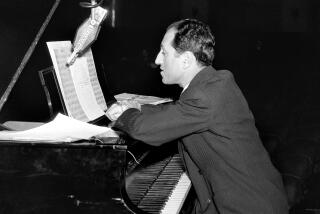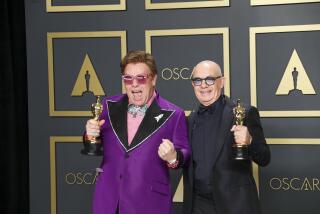Gershwin niece sticks close to the basics in tribute
The stage appeared to be set up for major activity Tuesday night at Catalina Bar & Grill. In addition to the usual piano, drum set, upright bass and several chairs for musicians, there were a conductor’s stool, a cloth-draped table and -- at stage left -- a mini-forest of six microphone stands.
Why the complicated set up on a stage usually devoted to the relatively basic needs of jazz ensembles? The answer came when the performers arrived -- a tuxedo-clad quintet of musicians led by musical director Steven Applegate, six equally elegantly dressed singers and the star of the evening, Alexis Gershwin. Retro though the environment may have seemed, it was an appropriate setting for the focus of the program -- “Gershwin Sings Gershwin” -- the classic songs of George and Ira, sung by the niece of the celebrated duo.
Slender, auburn-haired Alexis Gershwin is the daughter of Frances Gershwin, the youngest sibling of brothers George and Ira. And one hoped that her performance would be an insightful rendering of the songs fleshed out with close-up, anecdotal material. Her mother reportedly was often the first person to try out new songs by her brothers.
But that’s not quite the way the performance worked out. Aside from a few brief comments, most of the set was devoted to a continuing flow of Gershwin songs. The opportunity to hear such classics as “How Long Has This Been Going On?,” “They Can’t Take That Away From Me,” “Soon,” “Isn’t It a Pity?” and “I’ve Got a Crush on You” makes for an entertaining evening, regardless of the circumstances, of course. And the program was enhanced by Alexis Gershwin’s inclusion of rarely heard introductory verses to songs such as “Nice Work If You Can Get It” and “The Man I Love” and the buoyant enthusiasm and lush vocal harmonies from the six back-up singers.
Despite her familial connection, however, Alexis Gershwin brought little interpretive illumination to the songs. Her voice -- sometimes plaintive, sometimes wavery -- was more enthusiastic than accomplished, and she was at her best when she sang in relatively reserved fashion. It was in those moments, rather than when she reached for bigger climaxes, that one could sense a small but engaging whisper of a meaningful connection with her family heritage.
More to Read
The biggest entertainment stories
Get our big stories about Hollywood, film, television, music, arts, culture and more right in your inbox as soon as they publish.
You may occasionally receive promotional content from the Los Angeles Times.










